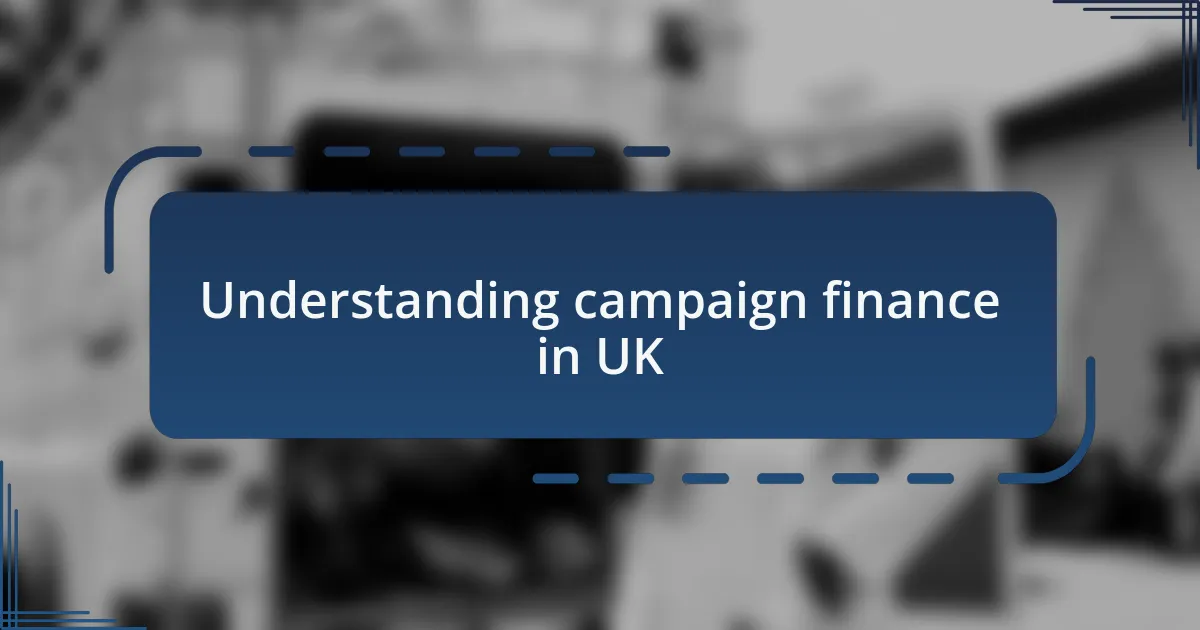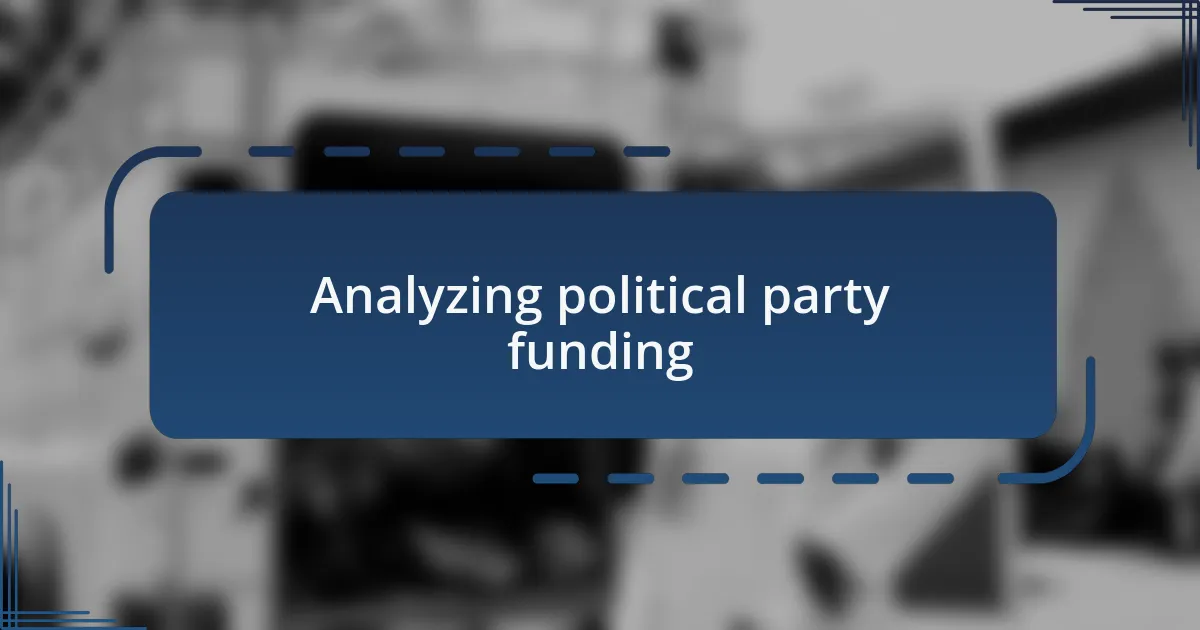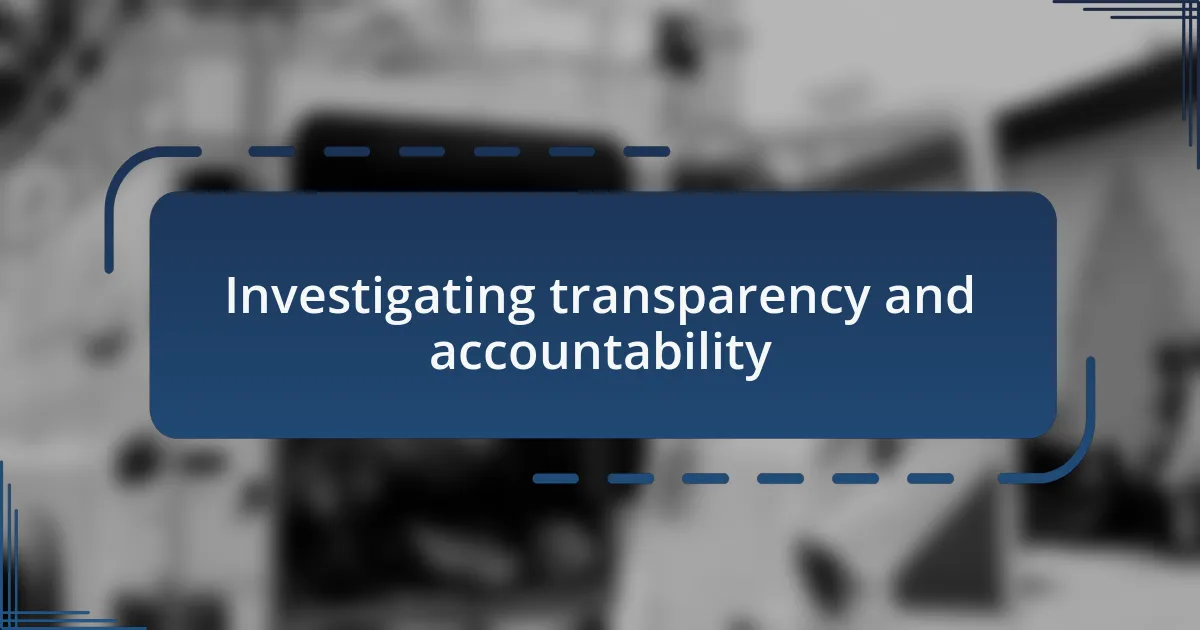Key takeaways:
- Campaign finance in the UK is complex, emphasizing transparency and accountability to inform voters about funding sources.
- Individual contribution limits aim to reduce wealthy influence, but disparities still exist due to group funding mechanisms.
- Tools for tracking donations, like the Electoral Commission’s registry and social media analytics, enhance understanding of financial influences on political campaigns.
- Lack of transparency in donations can lead to mistrust and an uneven playing field, highlighting the need for stricter disclosure laws to empower voters.

Understanding campaign finance in UK
Campaign finance in the UK can feel like a labyrinth to navigate. I remember my initial confusion while trying to grasp the various regulations that govern political donations. It’s not just about the money; it’s about transparency and accountability, ensuring that voters know who’s financially backing candidates and parties.
One striking aspect is the limit set on individual contributions, which aims to curb excessive influence from wealthy donors. I often wonder, how effective are these limits in truly leveling the playing field? From my observations, while the rules are in place, the underlying dynamics can still lead to disparities, especially when we consider funding through large blocs or party memberships.
Moreover, the disclosure requirements for campaign funding serve as a vital check against corruption. The thrill of dissecting financial reports can be enlightening, but do they provide the full picture? I’ve found that while the numbers are out there, understanding the implications behind them often takes a deeper dive into the nuances of political affiliations and the motivations of funders. Each report tells a story, one that can significantly shape our political landscape.
![]()
Tools for tracking campaign donations
When it comes to tracking campaign donations, several tools can help make the process more manageable. For instance, I often rely on platforms like the Electoral Commission’s own online registry, which provides searchable databases of donations and loans to UK political parties. It can be fascinating to pull up the records and see who’s funding whom—it adds a whole new layer to political narratives that I love exploring.
There’s also software like OpenSecrets, which, although primarily focused on U.S. politics, offers great insights into the kind of detailed analysis one can aspire to in the UK context. I’ve often found myself wishing for a similar service tailored specifically for UK campaign finance, as the transparency it provides can really paint a vivid picture of financial influences. Have you ever wondered who truly holds the purse strings in your local elections?
On a more tech-savvy front, social media analytics tools can play a surprising role too. By tracking political advertisements and their funding sources on platforms like Facebook or Twitter, I’ve gained a clearer view of how online donations are impacting campaigns. It’s not always straightforward, but diving into these digital spaces reveals so many connections that traditional reports might miss. The digital age has certainly changed the game—what do you think these changes say about the future of political funding?

Analyzing political party funding
When analyzing political party funding, I always find it intriguing to uncover the sources behind the financial support. It often surprises me how intertwined business interests can be with political agendas. For example, during one analysis, I discovered that a major construction firm heavily funded a local party, raising questions about potential conflicts of interest in urban development policies. Have you ever thought about how business contributions might shape the political landscape in your area?
The nuances of party funding can reveal broader trends in political engagement. I remember a time when I stumbled across a trend showing that smaller parties often rely on grassroots funding, while larger parties attracted corporate donations. It made me reflect on the different values at play—are voters more inclined to support parties that demonstrate genuine community backing, or do they gravitate toward those with substantial financial backing? This dichotomy highlights a compelling narrative worth exploring further.
Additionally, the timing of donations can be an enlightening aspect to investigate. I recently noticed that donations often surged ahead of significant policy announcements or election dates. This pattern suggests a calculated strategy from donors looking to influence key decisions. I sometimes wonder, as voters, how aware we are of these underlying dynamics and whether it affects our perceptions of the political process.

Investigating transparency and accountability
Investigating transparency and accountability in campaign finance is crucial for understanding the integrity of our political system. I remember attending a local council meeting where a community member raised concerns about undisclosed donations. It struck me how easily these financial ties can remain hidden, leaving the public in the dark about who truly holds power. Have you ever felt like your voice is muted by unseen influences in politics?
The implications of weak accountability measures can be staggering. During my research into past elections, I encountered multiple instances where parties failed to report contributions accurately. This lack of transparency not only breeds mistrust among citizens but also creates an uneven playing field for candidates. I often found myself asking: what would happen if voters demanded stricter disclosure laws? Would it give us the clarity we need to make informed decisions?
Moreover, the emotional impact of transparency—or the lack thereof—can’t be overlooked. I recall speaking with a young activist who expressed frustration over the opacity of funding sources in a recent campaign. They felt disenchanted, believing that their votes were undermined by hidden agendas. Situations like this remind me of the vital role that accountability plays in inspiring civic engagement. If we don’t know who is funding our leaders, how can we trust them to represent our interests?